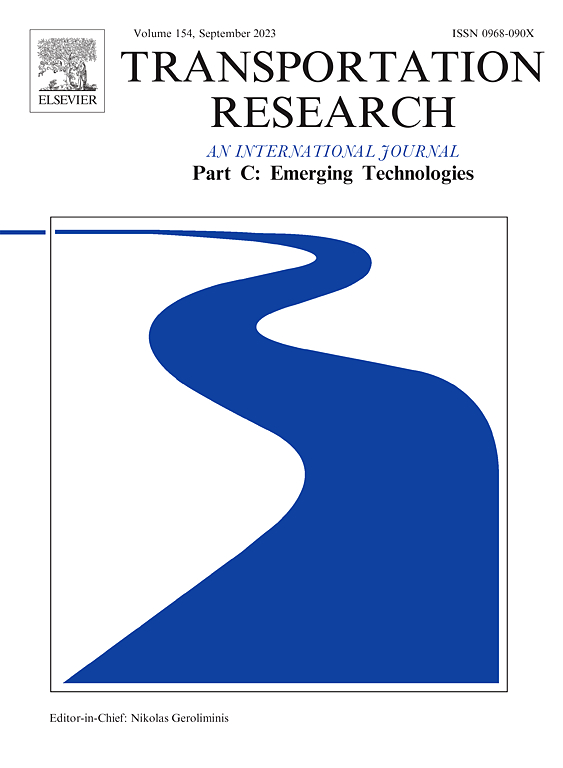A market-based efficient matching mechanism for crowdsourced delivery systems with demand/supply elasticities
IF 7.6
1区 工程技术
Q1 TRANSPORTATION SCIENCE & TECHNOLOGY
Transportation Research Part C-Emerging Technologies
Pub Date : 2025-04-01
DOI:10.1016/j.trc.2025.105110
引用次数: 0
Abstract
Crowdsourced delivery (CSD), or crowd-shipping, is an emerging business model that leverages the underutilized or excess capacity of individual drivers to fulfill delivery tasks. This paper presents a general formulation of a large-scale two-sided CSD matching problem, considering demand/supply elasticity, heterogeneous preferences of both shippers and drivers, and task-bundling. We propose a set of methodologies to solve this problem. First, we reveal that the fluid–particle decomposition approach of Akamatsu and Oyama (2024) can be extended to our general formulation. This approach decomposes the original large-scale matching problem into a fluidly-approximated task partition problem (master problem) and small-scale particle matching problems (sub-problems). We propose to introduce a truthful and efficient auction mechanism to the sub-problems, which enables the observation of privately perceived costs for each shipper/driver. Furthermore, by finding a theoretical link between the auction problems and random/perturbed utility theory, we succeed in accurately reflecting the information collected from the auctions to the master problem in a theoretically consistent manner. This reduces the master problem to a smooth convex optimization problem, theoretically guaranteeing the computational efficiency and solution accuracy of the fluid approximation. Second, we transform the master problem into a traffic assignment problem (TAP) based on a task-chain network representation. This transformation overcomes the difficulty in enumerating task bundles. Finally, we formulate the dual problem of the TAP, whose decision variable is only a price/reward pattern at market equilibrium, and develop an efficient accelerated gradient descent method. The numerical experiments clarify that the proposed approach drastically reduces the computational cost of the general and complex CSD matching problem ( 700 times faster than a naive method) without sacrificing the accuracy of the optimal solution (mostly within 0.5% errors).
求助全文
约1分钟内获得全文
求助全文
来源期刊
CiteScore
15.80
自引率
12.00%
发文量
332
审稿时长
64 days
期刊介绍:
Transportation Research: Part C (TR_C) is dedicated to showcasing high-quality, scholarly research that delves into the development, applications, and implications of transportation systems and emerging technologies. Our focus lies not solely on individual technologies, but rather on their broader implications for the planning, design, operation, control, maintenance, and rehabilitation of transportation systems, services, and components. In essence, the intellectual core of the journal revolves around the transportation aspect rather than the technology itself. We actively encourage the integration of quantitative methods from diverse fields such as operations research, control systems, complex networks, computer science, and artificial intelligence. Join us in exploring the intersection of transportation systems and emerging technologies to drive innovation and progress in the field.

 求助内容:
求助内容: 应助结果提醒方式:
应助结果提醒方式:


